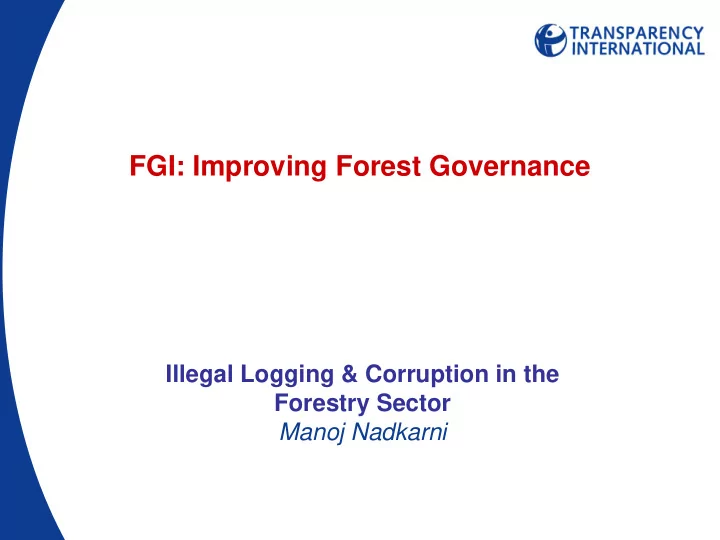

FGI: Improving Forest Governance Illegal Logging & Corruption in the Forestry Sector Manoj Nadkarni
Is this a coincidence?
Why is TI in the forestry sector? Demanded by the National Chapters in the Asia Pacific region …Because forests and forestry are economically important to the region economically and socially Revenues, taxes, ancillary industries, transport, livelihoods Illegal logging robs countries of natural, financial, and social resources Corruption drives illegal logging and its timber trade…
Illegal timber trade needs corruption to survive Logs, timber and wood products can only be sold with the connivance of a number of institutions (transport, customs, environmental protection agencies, police, port authorities) This is why the Chapters wanted us to design a forestry programme for them. Funding started in Jan 2009 Source: inWent 2005
Forest Governance Integrity Programme Vision • A global society where corruption-free forest governance and corruption-free sustainable management of primary forest enable increased economic development, poverty reduction, and environmental protection. • Goals • The Programme aims to contribute to curbing corruption which engenders illegal and unsustainable deforestation and, to strengthen forest governance systems • Right now in Asia Pacific but starting to expand
The FGI programme Based on the idea that corruption is a primary driver of illegal logging and poor forest management Phase 1: Papua New Guinea, Solomon Islands, China, Malaysia and Indonesia. • EU and AusAid funded, finished May 2011 PAC REDD: Vietnam, Papua New Guinea and Indonesia. • Funded by NORAD Phase 2: Papua New Guinea • Funded by FAO Forest governance advocacy and REDD research in Malaysia • Funded by Embassy of Norway in KL
Programme outline The FGI is a multi project programme, looking at both demand and supply of timber
How is corruption to be fought? More laws, better enforcement, harsher penalties…? • These may just make corruption more lucrative and drive activities deeper underground Along with making corruption more difficult: There must be an awareness of the destruction caused by corruption and The value of integrity and transparency must be made known to government officials, private sector and ordinary citizens CSOs need to be empowered to say that they don’t see corruption as being the norm This understanding is an essential element of the FGI
Some areas where anti-corruption work needs to be done foreign bribery and political influence land and forest concessions timber laundering judicial corruption financial transactions tracking unsustainable demand for forest products
Overall Approach Through developing cooperation with partners and forming networks , the Programme intends to support ongoing programmes and initiatives seeking to achieve similar goals and objectives and to develop advocacy strategies and activities through… …multistakeholder processes and consultations But based on TI’s particular expertise in delivering tools and measures to promote anticorruption activities, transparency and accountability
Links to TI’s other work Links to TI’s other tools: CPI, BPI, integrity pacts, private sector work….. And the Global Corruption Report Sectoral reports.. judiciary, water, construction, and now just released, one climate change
Questions? mnadkarni@transparency.org Thank you
Recommend
More recommend